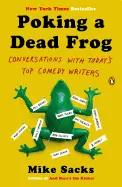
Poking a Dead Frog - by Mike Sacks
ISBN: 9780143123781Date read: 2019-01-02
How strongly I recommend it: 1/10
(See my list of 430+ books, for more.)
Go to the Amazon page for details and reviews.
I thought it was going to be about the craft of comedy, but it was mostly about the business: TV staff writers talking shop.
my notes
Avoid anything you feel is a cheap laugh based on shock or just being dirty. You can always get a laugh, but you don’t want it to come at the price of your dignity.
Writers tend to write ordinary people in weird situations.
Performers tend to write weird people in ordinary situations.
Writers are obsessed, with originality.
We must always move forward, never backward.
So that once something has been done, it should perhaps be built upon, but never, ever repeated.
For performers, the fact that something has been done before isn't a problem.
People get extremely angry when you create comedy that isn’t funny.
Make everything as personal and specific as you can.
It works when screenwriters make their writing too specific to their own lives. The specificity makes it brilliant.
“Midnight Run” : the tightest screenplay ever written - not one wasted word - and a dozen indelible characters with strong personalities, each with specific goals and realistic motivations.
Sadly, the world - and you might not know this - is imperfect. (I like the comic placement of the middle phrase.)
The best ending for a story is at once inevitable and surprising. That it was the only way it could’ve happened, and yet the audience didn’t see it coming.
Anything I’ve ever written that I felt was really great, I inevitably will look at two years later and think, Oh, God, this is so amateurish and terrible. But that’s a good thing.
Your attitude has to constantly be, “Who is this rank amateur, and how can I teach him how to write?”
The teacher would write a phrase from a Shakespeare play on the board.
We had two minutes to think, eight minutes to compose, two minutes to correct, and then we put our pencils down: 2-8-2.
That is how you train writers.
When writers have all the time in the world, we don’t do shit.
I want to write a joke so good that it somehow rights the rest of my life. That’s the nice thing about having demons. It makes you very productive.
Working aloud, talking out every line, kept the show from sounding overly written.
When you write alone, and have all the time in the world, you end up rewording sentences, editing and re-editing clauses, playing around with syntax - and your jokes tend to stiffen up as a result.
They sound labored over — unnatural.
At The Onion, the goal was to never have something sound like a joke. Comedy was delivered as fact. Because of that, we squeeze jokes into introductory clauses. We mix setups and punch lines together: a really dry and understated approach.
The timing is different when something is performed versus when it’s read silently on a page.
In front of a live audience - you want laughs.
I love comedy that’s a slow burn, where it takes a couple of seconds to connect all the different bits of information in a joke before it lands.
Mix emotions. I like comedy that has moments of heart in it, or sadness, or fear. I like comedy that makes people feel different things while they’re laughing.
Nothing sharpens your writing faster than the desperate desire for validation. Having your self-worth inextricably linked to your work may be unhealthy, but it’s also responsible for most of my success.
Rewriting is everything.
Keep rewriting until you get what you want, and then write some more.
You never finish anything, you just abandon it.
When you say, “I can’t do better,” you stop.